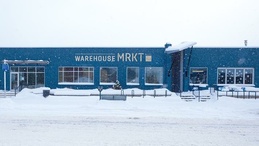From the Heart of Ebola
Nov. 30, 2014
Petoskey Woman Confronts Terrible Virus with Courage, Love
Surrounded by death in a Liberian Ebola unit, nurse Kelly Suter writes heartbreaking letters of hope home to Petoskey. The 29-year-old woman has spent her life training to provide relief in circumstances like this. She always wanted to be a missionary and began writing letters from the missions she served years ago, but the letters she sends from Liberia are different.
HOPE IN HOPELESSNESS
Suter has tended the sick in the Amazon, worked earthquake recovery in Haiti and cared for refugees in East Timor.
She posted letters from all of these places, but the letters from Liberia, where she works at an Ebola treatment unit operated by International Medical Corps, have resonated beyond her circle of family and friends. They’ve spread through Facebook and email chains and are popular on the website of the Catholic relief organization that placed Suter in Africa, Regnum Christi.
Letters from earlier missions focused on the hope she found when confronted with problems that could be solved.
"In Haiti, it was infrastructure. In Brazil, it was lack of resources after horrible floods," said longtime friend Jane Poquette. "This, there really isn’t a fix for it."
An Ebola patient is occasionally cured, but many die horrible deaths.
Poquette believes Suter is able to connect with people because she’s putting a human face on this frightening epidemic.
"This is something that scared people, and her letters are able to calm people," she said. "You can picture that kid dying in her arms with just the words she uses. She will find hope in hopelessness; she will find peace in unrest."
SUFFERING, DYING AND SURVIVING
The letters began when Suter arrived at the Ebola treatment unit in October. Her goal for the communications was to explain her decision to go to Africa and to share stories of "suffering, dying and surviving."
After spending the summer in Petoskey, Suter had been on assignment in East Timor when she was asked to serve in West Africa. She accepted, but the seasoned missionary said the prospect left her with an awkward and unfamiliar feeling–fear.
"I have never been afraid of relief work and the places it has taken me, but I found myself hesitant to board my final connecting flight in Brussels, as it would take me into the heart of Ebola," Suter wrote.
She soon learned that fear could save her life in a place where the only thing between a healthcare worker and Ebola is constant attention to the sterilization protocol.
Suter compares the fear and the need to wear cobbled-together hazardous materials suits to having a gorilla on her back.
"Despite how psychologically unhealthy that sounds, I would rather work with many fearful "˜gorilla burdened’ nurses than even one that claims to be fearless," she wrote. "A mistake from one can have consequences for all."
GEORGE AND LITTLE WILLIAM
As soon as she arrived, Suter learned how furious and unpredictable Ebola can be. John had just been admitted to camp and had survived his first night in the "suspected" ward, an area for patients who haven’t yet tested positive for Ebola.
The following day, Suter kept the man hydrated by giving him water with a syringe. She left to get him a blanket and the man took a bad turn.
"When I returned, he looked at me with large, frightened eyes and began to gasp for air," Suter wrote. "Out of habit, I quickly looked around, expecting to find life saving medications, equipment or assistance. My fogged goggles brought me back to reality and I turned back to John. Unable to do anything else, I held his hand and talked to him until the gasping ceased and he left this world."
Later, Suter wrote about George who recovered from Ebola and developed immunity. "Of course, not every story is sad," Suter wrote. "There are many that survive and the moment they find out they beat the virus is an emotional moment for us all. George danced his way, with staff and remaining patients cheering him on, out of the confirmed unit."
Just as George was checking out of the treatment unit, he discovered his five-year-old son William was checking in. George stayed.
"Little William is now the best cared for patient in that unit, as his dad is painstakingly attentive to his needs and never leaves his side," Suter wrote.
THE DARKNESS RETURNED
Just days later, a projector had been found and the patients were able to watch "The Lion King." The happiness almost made Suter cry.
"As the patients watched the movie, the staff watched the patients, mesmerized and elated by the joy on their faces," Suter wrote.
Soon, however, the darkness returned.

Suter was conducting nightly rounds when George rushed out of his son’s room. The boy who’d been so happy just hours before was now near death.
"Little William had begun to seize," she wrote. "We gave him some medication to stop the seizure and cleaned him up with George’s help. After the seizure, William was nearly unresponsive except for an occasional little whimper. George stayed close to him, rubbing his back and speaking softly to him. After about 15 minutes, with George, myself and the physician at his bedside, William passed away."
IT’S NOT EASY. IT’S MY SISTER
One of Suter’s sisters, Kim Groff, said she supports Suter’s missionary work, but she said it’s difficult to have a loved one on the front lines of Ebola.
"It’s not easy. It’s my sister. I love her. It’s never easy to hear that she’s doing things like that," Groff said. "It’s heartbreaking to know every time you talk to her, it might be the last time you talk to her."
Groff, a mother of four who moved to Clarkston after studying nursing in Petoskey, said she texts or talks to Suter everyday and she now understands it is not as dangerous for healthcare workers in West Africa as she first believed.
"I think there is a lot of ignorance, even on my part," Groff said. "When she left, I was so nervous. I was, "˜Oh my gosh, this is a suicide mission. What are you doing?’" Groff has learned that rigorous hand washing and decontamination to prevent the spread of the virus can keep healthcare workers safe. The painstaking process of taking off a hazmat suit at the end of a shift, for instance, takes 30 minutes at the Ebola treatment unit.
"As you get educated, you’re like, "˜OK, slow down. Take a breather. Look at the facts,’" Groff said.
Suter’s online letters have helped Groff understand Ebola up close.
"When you start reading those, for me at least, you realize that there are faces," Groff said. "It was eye-opening for me."
A LITTLE COAXED

Suter comes from a large Catholic family and is the second oldest of six children, with three brothers and two sisters.
She grew up in Kalamazoo and her family moved to Petoskey in her first year of college. Today, she considers Petoskey her home.
She said she was raised to help other people, but that it took some coaxing.
She visited nursing homes as a child and didn’t like it; she was made to rake leaves for elderly neighbors.
"It took some gentle and consistent guidance from my mom, but it gradually made an impact and later became a way of life I would freely choose. I tell her now that the work I do is her fault. She created the monster," Suter wrote in an email interview with the Express.
Following high school, Suter took part in humanitarian missions and realized she could do more to help if she was a nurse. A week after she graduated from nursing school, she was on a mission in Mexico.
Suter said she isn’t worried about the fear and ignorance she expects to face upon her return home.
"I am not concerned about ignorance surrounding Ebola for my own sake," she wrote. "What concerns me is the fact that a lack of knowledge and the resulting irrational fear will prevent others from assisting in this fight."
ALWAYS WANTED TO HELP OTHERS
One of her brothers, Mike Suter, said he was proud of his sister’s appearance on "60 Minutes" on Nov. 9 where she was interviewed for a segment about the Ebola treatment unit.
"I might be biased, but I think she did great," he said. "She’s an inspiration. She’s well spoken. She knows how to get her point across."
Her family says that Suter always wanted to help others. Her youngest brother was born with Down syndrome and Suter helped raise him. Her siblings and friends note that Suter always had the qualities of a loving mother. To them, it seems a natural progression for Suter to sacrifice comfort and safety to help others.
"This doesn’t surprise me at all. This is Kelly," Poquette said. "This is her all the way. She’s always put other people ahead of herself."
Suter’s life today involves lots of sacrifices. Her meals consist of plantains and hot dogs. Her housing is infested with spiders. During her downtime, there is nowhere to go because nearby villages are unsafe to visit amid the epidemic. She faces a 21-day quarantine once she returns to the U.S. Rather than spend Christmas in quarantine, Suter will remain at work in Africa through the holidays.
"We’re kind of planning on doing a second Christmas when she gets back," Groff said.
CONTROL IT AT ITS SOURCE
Mike Suter believes his sister is doing work critical to everyone’s health.
"Would I have the guts to do it?" asked Suter, a physical therapy student at Grand Valley State University. "I don’t know–maybe. But I sure am glad there are people like her who do."
Dr. Terrie Taylor, a tropical disease specialist from Traverse City who has spent years traveling in Africa studying malaria, said we should be afraid of Ebola, but we shouldn’t be afraid of healthcare workers who travel overseas to fight it.
"I’m not scared of any tropical diseases except the hemorrhagic fevers [like Ebola]," Taylor said.
Taylor has never been near an Ebola outbreak, but said it is crucial that there are healthcare workers willing to combat Ebola at its source.
"It’s very important," Taylor said. "That’s the way to stem this epidemic–to wrestle it and control it at the source. That is the most effective way to deal with it."
Suter’s letters home can be found at: live.regnumchristi.org/author/ksuter/
Trending

Farm to Glass with Ethanology
When Elk Rapids distillery Ethanology committed to locally-sourced ingredients for their products, it seemed like they&rsquo… Read More >>
MRKT HLDY SHPPNG, aka Warehouse MRKT Holiday Shopping!
Shop the latest from local makers and vendors at the Holiday MRKT Share at Warehouse MRKT in TC, Saturday, Dec. 20, from 10a… Read More >>
Men and Ugly Sweaters
Those two things don’t always go together, but on Dec. 19, you’ll see both out and about in Petoskey and Harbor … Read More >>


